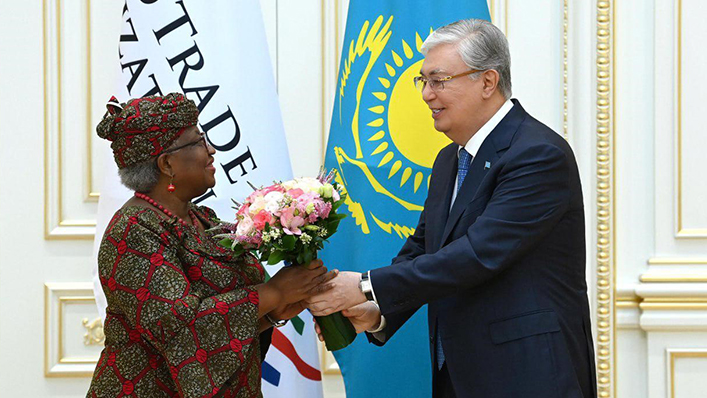
At the Second Central Asia Trade Policy Forum, organized by the WTO in partnership with the Asian Development Bank (ADB) and the International Trade Centre (ITC) under the theme “Economic integration through WTO accession and membership”, she delivered a keynote address. She highlighted the region’s vast potential and underscored that WTO accession and membership can be leveraged to improve regional and international economic integration, attract foreign investment, and promote economic growth.
The three-day Forum brought together representatives from the region – from both acceding governments and current WTO members – and partner institutions. Participants discussed the opportunities and challenges of WTO accession and post-accession through a regional lens.
Director-General Okonjo-Iweala was joined by Kazakhstan’s Minister of Economy Arman Shakkaliyev and National Bank Chairman Timur Suleimenov, who served as Chairperson of the 12th Ministerial Conference (MC12) in Geneva in 2022. She commended the Government of Kazakhstan for hosting the Forum and for providing a platform for discussions on systemic issues related to the WTO “through the regional lens of Central Asia”.
She also thanked Kazakhstan for co-hosting MC12 and for its continued leadership on accession-related issues, particularly its contribution to the work of the WTO’s Group of Article XII Members.
Director-General Okonjo-Iweala highlighted the region’s role as a transit hub for trade, noting the potential of the Trans-Caspian International Transport Route (TITR) to enhance connectivity between Europe and Asia and drive regional economic growth. Also known as the Middle Corridor, this route is a network of transport routes that replicates the ancient Silk Road, extending from China to Europe across Kazakhstan, the Caspian Sea and the Caucasus into Turkey.
DG Okonjo-Iweala observed that trade along this corridor had grown impressively in recent years and could triple in volume by 2030. To fully realize this potential, however, the region must combine investments in hard infrastructure with improvements in soft infrastructure, notably through implementation of the WTO Trade Facilitation Agreement which would streamline customs and transit procedures and decrease trade costs by more than 11%.
With the addition of “digital” trade facilitation measures, trade costs could be reduced even further. Lower trade costs, she added, could help bring the Central Asian economies from the margins to the mainstream of global production networks. She also highlighted the relevance of digitally delivered services, noting that while countries in this region may be landlocked, they do not need to be digitally locked.
Despite multiple challenges currently faced by the region, Director-General Okonjo-Iweala expressed enthusiasm at the uptick in momentum for regional integration efforts, highlighting the role WTO accession and membership can play in enhancing such endeavours. “The countries of the region are placing a pronounced emphasis on greater global and regional integration and are seeking to rebalance their intra-relationships with increased trade and connectivity,” she said.
She underlined the progress made by Uzbekistan, Turkmenistan and Azerbaijan in their accession negotiations. Uzbekistan had intensified its negotiations last year, and the Working Party on its accession held its 8th meeting two weeks ago. Turkmenistan also commenced its accession process in 2022 and is actively preparing its initial documentation package. Azerbaijan reactivated its accession last year after a six-year hiatus.
“I am excited to see their renewed engagement and the significant progress registered so far,” Director-General Okonjo-Iweala said. Her full remarks are here.
The Central Asia Trade Policy Forum runs until 5 June and will also feature thematic sessions on technical assistance for accession and post accession, trade facilitation, and the trade and environment nexus.
Share
Reach us to explore global export and import deals